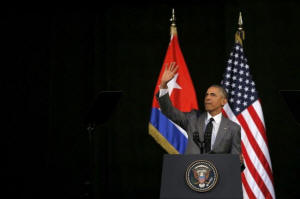|
Obama administration ends special
immigration policy for Cubans
 Send a link to a friend
Send a link to a friend
 [January 13, 2017]
By Patricia Zengerle [January 13, 2017]
By Patricia Zengerle
WASHINGTON (Reuters) - The Obama
administration on Thursday repealed a measure granting automatic
residency to virtually every Cuban who arrived in the United States,
whether or not they had visas, ending a longstanding exception to U.S.
immigration policy.
The end of the "wet foot, dry foot" policy, which allowed any Cuban who
reached U.S. soil to stay but returned any picked up at sea, is
effective immediately. Cuban officials had sought the change for years.
The shift had been in the works for months. It was announced abruptly
because advance warning might have inspired thousands more people to
take to the seas between the Communist-ruled island and Florida in order
to beat a deadline.
The United States and Cuba spent several months negotiating the change,
including an agreement from Cuba to allow those turned away from the
United States to return.
"With this change we will continue to welcome Cubans as we welcome
immigrants from other nations, consistent with our laws," Obama said in
a statement.

The Department of Homeland Security also ended a parole program that
allowed entry for Cuban medical professionals. That program was
unpopular with Havana because it prompted doctors to leave, sapping the
country's pool of trained health workers.
The U.S. Coast Guard intercepts thousands of Cubans attempting the
90-mile (145-km) crossing to Florida every year, but tens of thousands
who reach U.S. soil, including via Mexico, have been allowed to stay in
the country, while immigrants from other nations have been rounded up
and sent home.
Cuba welcomed the policy changes, saying they would benefit the whole
region by discouraging people-trafficking and dangerous journeys that
led to bottlenecks of Cubans in Central America last year.
"Today, a detonator of immigration crises is eliminated. The United
States achieves legal, secure and ordered migration from Cuba," said
Josefina Vidal, the Cuban foreign ministry's chief for U.S. affairs.
El Salvador's foreign ministry also welcomed the move, saying "there
cannot be migrants of different categories." Honduras, from where
thousands flee each year without the attraction of favorable U.S.
immigration policies, said it would wait to see if the flow of Cubans
actually reduced.
Anticipating the end of the policy, Cuban immigration has surged since
the 2014 normalization, said Ben Rhodes, Obama's deputy national
security adviser.
"People were motivated to migrate," Rhodes told reporters on a call,
noting some 40,000 Cubans arrived in 2015 and about 54,000 in 2016.
The administration had rejected Cuban entreaties to overturn the policy
before President Barack Obama's historic visit to the island last year,
although even some White House aides argued that it was outmoded given
efforts to regularize relations between the former Cold War foes.

"Wet foot, dry foot" began in 1995 under President Bill Clinton after an
exodus of tens of thousands of Cubans who were picked up at sea by the
Coast Guard as they tried to reach Florida.
Obama has been working to normalize relations with Cuba since he and
President Raul Castro announced a breakthrough in diplomatic relations
in December 2014. His administration has eased restrictions on travel
and trade, allowing more U.S. business with Cuba and improved
communications with the island.
"MIXED EMOTIONS IN LITTLE HAVANA"
The move to end the policy comes just eight days before the Democratic
president turns the White House over to Republican Donald Trump, who has
said the United States should get more concessions from Havana in
exchange for improved relations.
[to top of second column] |

President Barack Obama waves as he arrives to deliver a speech at
the Gran Teatro in Havana, Cuba March 22, 2016. REUTERS/Carlos
Barria

U.S. immigration policy has given Cubans benefits granted to nationals
from no other country. Until now, virtually every Cuban who made it to
U.S. soil was granted the right to stay in the country, the right to
apply for work permits and, later, green cards, which convey lawful
permanent residency.
Jeh Johnson, secretary of Homeland Security, said on a call that
Cuba will take back citizens as long as less than four years have
passed between the time the migrant left Cuba and the start of the
U.S. deportation proceedings.
Under the agreement Cuba will take back some 2,700 people who left
the island among 125,000 others during the Mariel boat lift of 1980,
fulfilling an agreement made in 1984 to take back 2,746 people who
the United States did not grant citizenship to, mainly people with
criminal convictions.
Cuba has previously taken back only a handful of that group.
The new policy sparked mixed emotions in Miami's Little Havana
neighborhood.
Mario Garcia, a Cuban mechanic in Little Havana, said the change
angered him.
"It's not like Communism has ended in Cuba, so why stop this that
has saved people's lives?" he said.
But Eulalia Jimenez, who is Venezuelan, said the policy was not fair
to migrants from other countries who also flee bad conditions.
"Why should only the Cuban people be able to come and make a life
for themselves?" Jimenez said.

Some U.S. lawmakers had been demanding a fresh look at the
immigration rules, saying Cubans coming to the United States simply
for economic reasons should not be automatically granted benefits
intended for refugees.
"This is a welcome step in reforming an illogical and discriminatory
policy that contrasted starkly with the treatment of deserving
refugees from other countries," Senator Patrick Leahy, a Democrat,
said in a statement.
Republican Senator Jeff Flake also said eliminating the policy was
"a win for taxpayers, border security and our allies in the Western
Hemisphere."
Flake and Leahy both support Obama's moves toward freer trade and
travel with Cuba. But U.S. Senator Marco Rubio said the incoming
Trump administration should reverse the part of the executive order
that ended the medical parole system, and said Cubans fleeing
political persecution should receive asylum.
The Department of Homeland Security is also eliminating an exemption
that prevented the use of expedited removal programs for Cuban
nationals picked up at ports of entry or near the border.
But an existing Cuban Family Reunification Parole Program is not
affected by Thursday's announcement and remains in effect.
(Additional reporting by Matt Spetalnick, Eric Beech, Roberta
Rampton and Ayesha Rascoe in Washington D.C., Zachary Fagenson in
Miami; Nelson Acosta and Marc Frank in Havana; Gustavo Palencia in
Honduras and Nelson Renteria in El Salvador; Editing by Michael
Perry and Frank Jack Daniel)
[© 2017 Thomson Reuters. All rights
reserved.]
Copyright 2017 Reuters. All rights reserved. This material may not be published,
broadcast, rewritten or redistributed.

 |